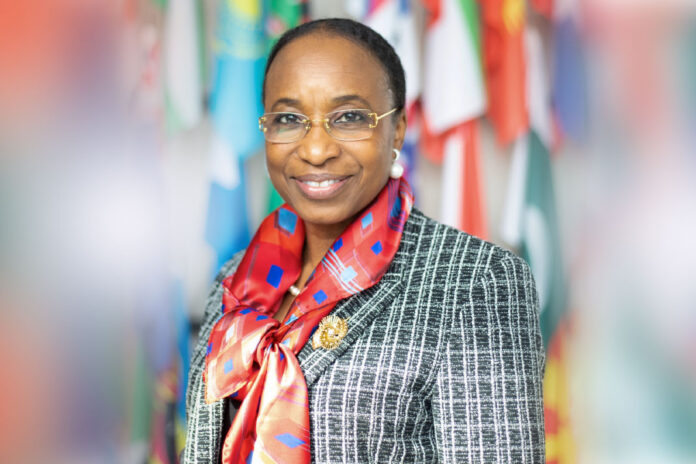At the recent World Entrepreneurs Investment Forum (WEIF), organised by UNIDO, the Woman This Month team met with Fatou Haidara, the Deputy to the Director General, Managing Director of the Directorate of Global Partnerships and External Relations and Director General’s Special Representative for Africa. In this insightful conversation with Farah Baig, the inspirational Ms. Haidara imparts insight into UNIDO’s global partnerships, key initiatives and opportunities across Africa, and sound advice for Woman This Month’s readers.
Thank you very much for taking the time to speak to us today. What are some of the key initiatives that UNIDO is currently undertaking to foster global partnerships and enhance external relations?
Women empowerment is an important topic, but in general, the way we look at industrial development at UNIDO is a process. It’s a holistic approach which involves different partnerships with policymakers, the private sector, research and development, and the civil society.
UNIDO’s way of working is to support national priorities. Many countries, if not all, have national plans and we support them within the mandate of UNIDO, which is industrialisation. However, industrialisation today is green which translates to talking about factors such as climate change, renewable energy and sustainability. In fact, our mandate at UNIDO, is inclusive and sustainable industrial development. While doing so, it’s important to see which are the best partnerships to tackle global challenges. While some are broader than others, at the end of the day our work is based on partnerships.
Now, when it comes to external relations, it’s more or less the same – the UN system. We believe strongly that one organisation alone cannot tackle the challenges; so, we build partnerships with other UN organisations. Furthermore, we strongly believe that today’s challenges cannot only be public but rather public-private partnerships.
Another key element is the focus on youth and on women because these are areas where one should really be investing.
How does UNIDO engage with African nations to promote industrial development and economic growth?
When it comes to Africa, we have a very close relationship with the African Union Commission and support the Agenda 2063 which is the African leaders vision for the continent. We also work with the regional economic commissions and communities on their regional initiatives. Then at the national level, we support each of our member countries in implementing national priorities. At each of these levels, we try to build as many partnerships as possible to tackle the challenges that they are facing.
Could you share some successful examples of partnerships between UNIDO and African countries that have yielded positive outcomes?
We have the Program for Country Partnership (PCP) which was implemented in a few African countries. At the country level, different ministries may work on their specific responsibilities with their partners. However, this programme brings all the partners to the same table and under the leadership of the country through the Prime Minister or President’s office. Ultimately, the idea is to have all the ministries involved in economic development together.
We have a very good example in Ethiopia which mobilised resources. We supported industrial parks and job creation for young people and women. UNIDO not only played a catalytical role, but helped to mobilise resources for the country’s priorities. In Senegal as well, we support the development of policies for industrial parks which also mobilises private sector investment and job creation.
This is a model that is working quite well and we try to emulate it as much as possible with other partners.
?In your role as Director General’s Special Representative for Africa, what are the main challenges you encounter in driving industrialisation efforts across the continent?
You know there are some challenges that are seen across all continents, but when it comes to Africa one challenge is that the level of industrialisation is low. The value addition is not at our expectation as Africans. We have a lot of resources, but most of the time they are exported as raw materials while we could transform them locally. This is part of the Africa vision – more economic diversification, more transformation and also intra-Africa trade, because when we talk about trading, we think of exporting outside Africa while we have a lot of opportunities to trade within the continent. This is a part of the agenda that we are supporting.
The challenge for me, which is something I mentioned during the WEIF panel, is the young population in Africa which is an asset. It’s a challenge if it’s not taken care properly in terms of education, skills development, entrepreneurship development and having a conducive environment for young people to invest in startups and have access to financial resources and markets. So, there is a range of services that we need to collectively provide in Africa to help them to foster growth. With technological advancements I think that could also be used to have more competitive enterprises and startups. This is how I see it: there are challenges but there are many more opportunities.
As Deputy to the Director General, what strategies do you employ to ensure effective coordination and collaboration within UNIDO and with external stakeholders?
With external stakeholders we have one principle which is cooperation, but good cooperation is based on a clear understanding of the objectives of what we want to achieve together. When this is clear, we then define our roles and bring the maximum number of partners around the table. For instance, at UN organisations we have our specific mandate but all work together for industrialisation. If our objective is clear, we partner to see how we support the country which is how I operate with external partners.
The key factor is defined objectives. This is how we build and maintain strong partnerships with our external stakeholders.
Coming to the WEIF, how essential are events of this stature to achieve these goals?
That’s a very interesting question. Economic development in several countries is mainly based on SMEs and this forum is a way to accelerate the implementation of the SDGs. Youth, women, private sector, partnerships and capacity building are some of the words we kept hearing throughout the event. The topics that are discussed are also very relevant.
I participated in the third edition and see how it has grown since then with over 60 countries being represented from across Asia, Africa and Europe in addition to Arab countries. As UNIDO, we also have a success story with the Kingdom of Bahrain which is an AD program – an entrepreneurship development and investment promotion that we can showcase because throughout the years we have created an ecosystem to support SMEs.
The WEIF also serves as an important platform for young entrepreneurs to network. It creates a platform for all involved to be in the same place including the policy makers, universities, young entrepreneurs, women, financial institutions and the UN.
As a woman in an essential leadership role, what are your thoughts on the scope for women to drive change? What would be your advice to women pursuing similar positions and wishing to have an impact on their society and wider regions?
I would say never give up. It’s not easy, but we should not wait for others to give us; we should take it. And we have the capacities to do so. With a magazine like yours, I see it as an encouragement for women to say it’s possible – that’s important. This is why I say never give up… because it’s possible. It might take time, and it takes effort, but what can we gain easily?





